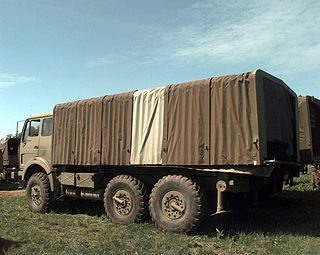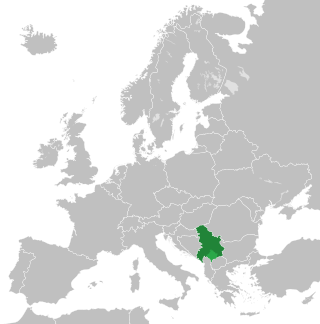
The State Union of Serbia and Montenegro or simply Serbia and Montenegro, known until 2003 as the Federal Republic of Yugoslavia and commonly referred to as FR Yugoslavia (FRY) or simply Yugoslavia, was a country in Southeast Europe located in the Balkans that existed from 1992 to 2006, following the breakup of the Socialist Federal Republic of Yugoslavia. The state was founded on 27 April 1992 as a federation comprising the Republic of Serbia and the Republic of Montenegro. In February 2003, it was transformed from a federal republic to a political union until Montenegro seceded from the union in June 2006, leading to the full independence of both Serbia and Montenegro.

United Nations Security Council resolution 1244, adopted on 10 June 1999, after recalling resolutions 1160 (1998), 1199 (1998), 1203 (1998) and 1239 (1999), authorised an international civil and military presence in the Federal Republic of Yugoslavia and established the United Nations Interim Administration Mission in Kosovo (UNMIK). It followed an agreement by Yugoslav President Slobodan Milošević to terms proposed by President of Finland Martti Ahtisaari and former Prime Minister of Russia Viktor Chernomyrdin on 8 June, involving withdrawal of all Yugoslav state forces from Kosovo.
An arms embargo is a restriction or a set of sanctions that applies either solely to weaponry or also to "dual-use technology." An arms embargo may serve one or more purposes:

United Nations Security Council resolution 713, adopted unanimously on 25 September 1991, after receiving representations from a number of Member States and commending the efforts of the European Community in the region, the Council decided to impose, under Chapter VII, an arms embargo on the Socialist Federal Republic of Yugoslavia, in light of the outbreak of fighting in the country. Resolution 713 was the first resolution that concerned the breakup of Yugoslavia.

United Nations Security Council resolution 724, adopted unanimously on 15 December 1991, after reaffirming resolutions 713 (1991) and 721 (1991) and noting a report by the Secretary-General Javier Pérez de Cuéllar on the situation in the Socialist Federal Republic of Yugoslavia, the council agreed to carry forward proposals for a planned peacekeeping operation in Yugoslavia and decided to establish a committee of the Security Council to consider matters relating to the arms embargo on the country.

United Nations Security Council resolution 727, adopted unanimously on 8 January 1992, after reaffirming resolutions 713 (1991), 721 (1991), 724 (1991) and considering a report by the Secretary-General Boutros Boutros-Ghali, the council welcomed the recent signing of an agreement in Sarajevo regarding a ceasefire to the conflicts in the Socialist Federal Republic of Yugoslavia.

United Nations Security Council resolution 757 was adopted on 30 May 1992. After reaffirming resolutions 713 (1991), 721 (1991), 724 (1991), 727 (1992), 740 (1992) 743 (1992), 749 (1992) and 752 (1992), the Council condemned the failure of the authorities in the Federal Republic of Yugoslavia to implement Resolution 752.

United Nations Security Council Resolution 1021, adopted on November 22, 1995, after recalling all resolutions on the situation in the former Yugoslavia, particularly resolutions 713 (1991) and 727 (1992), the Council set a date of March 13, 1996, for the suspension of most aspects of the arms embargo on the former Yugoslavia. Resolution 1074 (1996) terminated the remaining measures of the embargo.

United Nations Security Council resolution 1160, adopted on 31 March 1998, after noting the situation in Kosovo, the council, acting under Chapter VII of the United Nations Charter, imposed an arms embargo and economic sanctions on the Federal Republic of Yugoslavia, hoping to end the use of excessive force by the government.

United Nations Security Council resolution 1171, adopted unanimously on 5 June 1998, after recalling resolutions 1132 (1997), 1156 (1998) and 1162 (1998) on the situation in Sierra Leone, the council, acting under Chapter VII of the United Nations Charter, terminated the arms embargo against the Government of Sierra Leone.

United Nations Security Council resolution 1186, adopted unanimously on 21 July 1998, after recalling resolutions 1105 (1997) and 1110 (1997), the Council extended and strengthened the mandate of the United Nations Preventive Deployment Force (UNPREDEP) in Macedonia until 28 February 1999.

United Nations Security Council resolution 1199, adopted on 23 September 1998, after recalling Resolution 1160 (1998), the Council demanded that the Albanian and Yugoslav parties in Kosovo end hostilities and observe a ceasefire.

United Nations Security Council resolution 1203, adopted on 24 October 1998, after recalling resolutions 1160 (1998) and 1199 (1998) on Kosovo, the Council demanded that the Federal Republic of Yugoslavia comply with previous Security Council resolutions and co-operate with the NATO and Organization for Security and Co-operation in Europe (OSCE) verification missions in Kosovo.

United Nations Security Council resolution 1207, adopted on 17 November 1998, after recalling all resolutions concerning the conflicts in the former Yugoslavia, in particular Resolution 827 (1993), the Council condemned the Federal Republic of Yugoslavia for its failure to execute arrest warrants issued by the International Criminal Tribunal for the former Yugoslavia (ICTY).

United Nations Security Council resolution 1239, adopted on 14 May 1999, after recalling resolutions 1160 (1998), 1199 (1998) and 1203 (1998), the Council called for access for the United Nations and other humanitarian personnel operating in Kosovo to other parts of the Federal Republic of Yugoslavia.

United Nations Security Council resolution 1298, adopted unanimously on 17 May 2000, after reaffirming resolutions 1177 (1998), 1226 (1999), 1227 (1999) and 1297 (2000) on the situation between Eritrea and Ethiopia, the Council condemned continuing hostilities and imposed an arms embargo on both countries.

United Nations Security Council resolution 1343, adopted unanimously on 7 March 2001, after recalling resolutions on Sierra Leone and the region, including resolutions 1132 (1997), 1171 (1998) and 1306 (2000), the Council demanded that Liberia end its support for rebels in Sierra Leone and threatened the imposition of wide-ranging sanctions unless the country complied with the Security Council.

United Nations Security Council resolution 1345, adopted unanimously on 21 March 2001, after reaffirming resolutions 1160 (1998), 1199 (1998), 1203 (2000), 1239 (1999) and 1244 (1999) on the situation in the former Yugoslavia, the council condemned extremist violence and terrorist activities in parts of Macedonia and southern Serbia and called upon Kosovo Albanian leaders to condemn the violence.

United Nations Security Council resolution 1533, adopted unanimously on 12 March 2004, after recalling all previous resolutions on the situation in the Democratic Republic of the Congo, the council established a committee to monitor an arms embargo imposed on all foreign and Congolese forces in the east of the country.

During the Yugoslav Wars of the 1990s and early 2000s, several rounds of international sanctions were imposed against the former Yugoslav republics of Serbia and Montenegro that formed a new country called the Federal Republic of Yugoslavia.

















